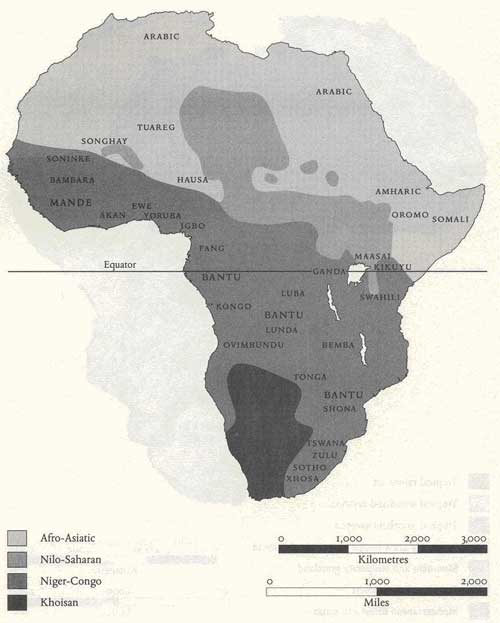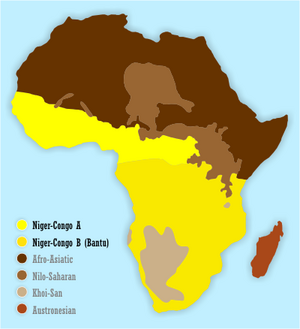Sociocultural Context
Africa's sociocultural context includes the pre-colonial and colonial history, varied political systems of governance, diverse cultures, and rapidly growing populations. Africa has a triple heritage (Indigenous, Islamic, and European) that defines the diverse social, political, and economic systems that exist across the continent.
Islamic heritage
The Arabs call Africa "Ifriqiya." The Romans call it Africa after the destruction of Carthage. The early contact of Islam with Africa began during the lifetime of the Prophet (571-632 AD). During this time a group of Muslims escaped Meccan persecution (in AD 615) by fleeing to Ethiopia, where they were given protection.
The Arab conquest of Africa began in earnest in the late 630s AD. At this time, northern Africa was not a politically secure or stable place. The region was governed from Constantinople and fell under the purview of the Pope; religious persecution was common and the peasantry and working class often had very little freedom. Against this backdrop, Islam spread rapidly as the religion of freedom from distant rule. In Egypt, for example, the native Copts were instructed by their bishop in Alexandria to offer no resistance to the Arab Muslims marching toward Egypt.
The true success of Islamization lies in the nature of Islam itself. Wherever the Muslims went, they took their religion and culture with them. The Arabic language formed almost a part of their religion, as the Qur'an was in Arabic. There were long-distance trade routes, running from north to south across the Sahara and along the eastern coast of Africa. Arab traders carried the message of Islam wherever they traveled. Further, wherever the Muslim conquests took place a large number of Muslims chose to settle down and build new lives. The period between 660-670 AD was remarkable for the expansion of Islam into Africa along the Mediterranean coast. Morocco came under Islamic influence in the 8th century with the founding of the city of Fez in 808. By the year 732 AD – the first centennial of Muhammed's death – his followers were the masters of a great empire that included north Africa, southwestern Europe, and western and central Asia. On the east coast of Africa, where Arab mariners had for many years journeyed to trade, Arabs founded permanent colonies on the offshore islands, especially on Zanzibar, in the 9th and 10th centuries. From there Arab trade routes into the interior of Africa helped the acceptance of Islam and led to the development of Swahili culture and language.
Prior to the 19th century the greatest gains made by Islam were in sub-Saharan Africa. The Islamization of western Africa began in the ancient kingdom of Ghana, where Mansa Musa (1307–1332) of Mali was among the first to make Islam the state religion. By the 16th century the empire of Mali and its successor-state Songhaj included several Saharan centers of trade and Muslim learning, such as Timbuktu. Further east, Islamic penetration followed the route of the Nile. In the late 18th and early 19th centuries, Africa, like the rest of the Muslim world, was swept by a wave of religious reform. Militant reformers, such as the Fulani and the followers of Hajj Omar, greatly extended the area over which Islam held sway in West Africa. Usumanu dan Fodio (1809) founded the Sokoto caliphate, which was eventually incorporated under British rule into Nigeria. In the 20th century Islam has gained more converts in Africa than has Christianity, which labors under the burden of identification with European imperialism.
Indigenous heritage
Africa’s indigenous heritage is rooted in the ancient, medieval, and modern kingdoms of Africa. Pre-colonial Africa has a long and rich history. Unfortunately, much of the history, traditions, customs, and artifacts were destroyed during Africa’s colonial era. Some misconceptions of African cultures then arose and were perpetuated for generations. Slowly, researchers are learning about rules of social behavior, codes of law, and organized economies from Africa’s past.
European heritage
The Western economic relationship with Africa probably began with the Roman occupation of North Africa beginning 146 BC at the end of the Third Punic War. This period saw the founding and growth of ancient Carthage, in what is today Tunisia. Trade with north Africa included transport of animals (camels, elephants, lions), gold and slaves to the Roman emperor. Western involvement with sub-Saharan Africa commenced much later and was intimately linked to the slave trade, which brought millions of people to Europe, North and South America and the Caribbean. Slave traders were followed by missionaries and economic traders, whose work culminated with the colonial era that ended only recently.

Language Use in Africa. Source: "Africa: a biography of the continent"
The African continent has a complex distribution of languages, religions, ethnicity, and family relations across the African landscape. Over 1,000 languages are spoken in the Sub-Sahara, and most do not have a written tradition.
Religion
The distribution of religions follows the history of visitors to the continent. Islam exists in the northern regions, the Horn (Somalia and Ethiopia), and the coastal corridors of Kenya, Tanzania, and Mozambique. Muslim minorities exist in several African states, including Nigeria, Chad and the Sudan. Christianity is important in the central and southern sections of Africa, as well as in Ethiopia, and there is a Roman Catholic presence in Rwanda, Burundi and Democratic Republic of Congo. The Anglican Church is found in Ghana, Nigeria, and Kenya, and the Presbyterian faith is common in Malawi. In most cases, these Christian religions exist in parallel with traditional beliefs despite many generations of missionary efforts to the contrary.
Growing population
Another part of Africa's sociocultural context is the rapidly growing population. Africa is reported to have the highest fertility rates in the world (5.7 children per family). Sub-Saharan Africa alone contains 11% of the world's population. There are high infant mortality rates (94:1000) and growing proportions of young dependents (44%). Many factors contribute both to population growth and early mortality, including early marriages, ethnic rivalries, lack of basic education, urban-rural residence, and economic status.
Disease
The global community is very aware of the pandemic of HIV/AIDS. Sub-Saharan Africa has 83% of the world's total AIDS deaths and 87% of the world's HIV-infected children. Botswana, with an adult HIV rate of 35.8% (in December 2000), was at that time the country worst affected. Swaziland has recently surpassed Botswana as the country with the world's highest rate of HIV/AIDS infection. In Namibia, Zambia, and South Africa, one in four adults are HIV positive, causing tremendous stress on families (and national health care systems) and depleting the nations of skilled workers. However, it is important to note that although AIDS is indeed a pandemic in Africa, the numbers of those infected with the virus is often exaggerated. Some numbers give the percentage of people affected with AIDS in relation to the size of the countries they live in, but neglect the fact that congestion is another major problem on the continent. Also, the idea that AIDS is predominant in rural areas because of higher levels of immorality, pre-marital sex and casual sex, is false because in actuality, these numbers are similar if not higher in urban areas.
Other endemic diseases are of global concern as well, such as malaria, sleeping sickness, and yellow fever. The distribution and severity of these diseases varies greatly between urban and rural environments and where there are variations in economic and environmental conditions and cultural and behavioral practices. Rural areas tend to rely on traditional medicinal practitioners and itinerant drug vendors, whereas several urban areas have modern technologies to facilitate health-care delivery. The lack of adequate health-care facilities and the continuing problems associated with endemic and pandemic diseases are having a devastating impact on the economic and social lives of Africans.
